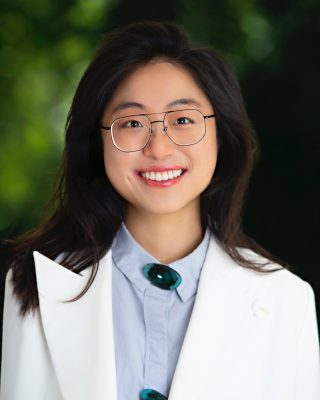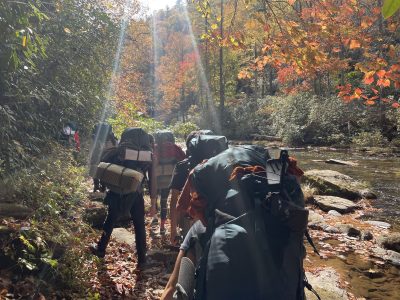Q&A with Yiran Song, MS Candidate in Biostatistics, Clinical Research GRA
What was your background before enrolling in the MS program at Gillings?

Yiran Song
I was born and raised in China. I finished my BE in Biological Engineering (Food Science) at Shanghai Jiao Tong University in 2020. I initially deferred acceptance to UNC because of the Covid pandemic and instead worked as a Machine Learning Engineer for Artificial Intelligence Applications, like Quality inspection on 3C electronics product surfaces to protect workers from the harsh repetitive situation of harming eyes and health in Chinese factories.
My journey in public health started with my exchange to Waseda University in Japan, in 2018. I did field research on the aging society in Sukumo, a city with a 35% aging rate. There, aging is not just a number, but is seen in abandoned primary schools and empty streets with rusty old swings, however, there are innovative nursing homes with warm service, and continued local volunteers for forest conservation. The people in Sukumo and their courage in accepting the truth and deep love for the community cheer me to keep moving on public health, no matter how hard it is.
Will you tell us about your experience working with FHI 360?
I worked on an HIV/AIDS project this summer at FHI 360 (Family Health International).
As a biostatistician, the local partners in Nigeria let me understand the importance of data analysis in the local setting and find the optimized solution under limited resources. We want to reduce the rates of interruption in antiretroviral therapy (ART) for clients living with HIV, using our algorithms to help healthcare providers with more targeted and personalized services. However, I saw how messy data was with the missing and imbalanced issue. I researched machine learning and deep learning methods to solve the problem and enhance the algorithm’s performance. Finally, I tackled the issue by introducing the idea of “Anomaly Detection” which could help in these extreme cases. It was an interesting loop to try, implement, and test the algorithms while understanding our data deeper. Another interesting part is when I used different programming languages for both Python and R, understanding them deeper in comparison and real-world system integration.
Beyond this, when researching HIV/AIDS, I was so excited to see the goal to end AIDS as a public health threat by 2030, on the HIV Prevention 2025 roadmap. At the same time, however, I found the colliding HIV/AIDS, COVID-19, and recent Monkeypox has placed the HIV effort under increasing threat, with disrupted health services and marked inequalities. It further let me understand how each disease or public health issue as a combination of social-economic-environmental problems is even more complicated.
What does “global health” mean to you?
Global Health for me means solving health issues and improving health by achieving equity in health for all people worldwide. There is no way to move but fight together to move forward. Together, we have no limitations. As a health professional, I want to leverage the information from the diverse drivers of health-seeking behavior and collaborate with professionals in different areas, like clinicians, epidemiologists, economists, politicians, etc. towards a better future. It would be my honor to devote myself to this lifelong journey to contribute to a better beautiful world.
Will you tell us about your experiences as an international student in Gillings?
I am grateful for the people I met and the community I have as my motivators and life-change, who let me thrive in brand-new environments here and grow both as a whole person and as a health professional.
In UNC, with the coaches in UNC wellness and therapists in CAPS and the community, I overcame depression during the pandemic and gradually healed from eating disorders, and fell in love with exercise. I remember the very first time in the fitness class in Student Recreation Center when I felt so embarrassed to do the posture. However, the group fitness instructor, Lauren, noticed and came to my side, guided me, and encouraged me to move on and try more different classes. I keep exercising for one and a half years. I have become a certified group fitness instructor through American Council on Exercise (ACE) this summer. This year, I joined UNC VPAS, Violence Prevention, and Advocacy Series, as a Sexual Violence Prevention Ambassador, and plan to become a Mental Health First Aider later this semester.
In Gillings, I love the warm academic environment provided by my school, professors, staff, and students, which taught me curiosity and motivated me to thrive academically. I started from an outsider to now serve as the International Student Co-Liaison, Biostatistics Student Association. We hosted events like “How to Survive American Biostatistics Classrooms: BSA International Student Meet & Greet” and brought the talk to build the international students’ community.
Will you tell us about your experiences working as a TA and RA while at Gillings?
Yes, of course. For the theoretical research, I am researching sampling projects for the Hispanic Community Health Study / Study of Latinos (HCHS/SOL) task force now. I enjoy involving in this journey for raising new ideas, performing simulation experiments, and discussing our findings on novel statistical methods with professors and talented team members.
For the statistical application, I have previously worked on the mental health issue of schizophrenia. One of the interesting points is when we found how difficult and time-consuming for clinicians to read tons of clinical notes. It raised our ideas to use natural language processing and machine learning to measure the severity and even more do the prediction for diagnosis. Now I am working with clinicians at Lineberger Comprehensive Cancer Center, which aims at improving patients’ life quality after surgery. I closely collaborated with the clinician, nurses, and team managers, who worked for more than two years to do the trials, interviews, and collect the data. Here I combined all the data sources, cleaned, and analyzed the data to find the patterns behind them.
I have also been working as a grader for two semesters, grading homework and holding biweekly office hours. I am on my journey to learn how to support and solve problems for fellow junior students effectively and warmly, especially during the very first period in the BIOS program.
Where do you see your career going, at the intersection of statistics and health?
Biostatisticians can have different interpretations and responsibilities in different working places, like pharmaceutical companies, CROs, biotech or hospital, and university research centers. My personal goal is to continue my study for the doctoral degree and explore my interest in academia afterward and do real-world collaborations with hospitals, NGOs, and policymakers.

Backpacking Trip on Fall Break
What is your favorite hobby?
I love nature and I live in adventure. Hiking and outdoor activities are my favorites, and I just came back from a 4-day unplugged backpacking trip during the fall break. I appreciate the beauty of nature and how much it could teach me. It nourishes my mind with fresh air and unique scenery and supports me to grow up as a whole person and keep curious about this amazing world.
